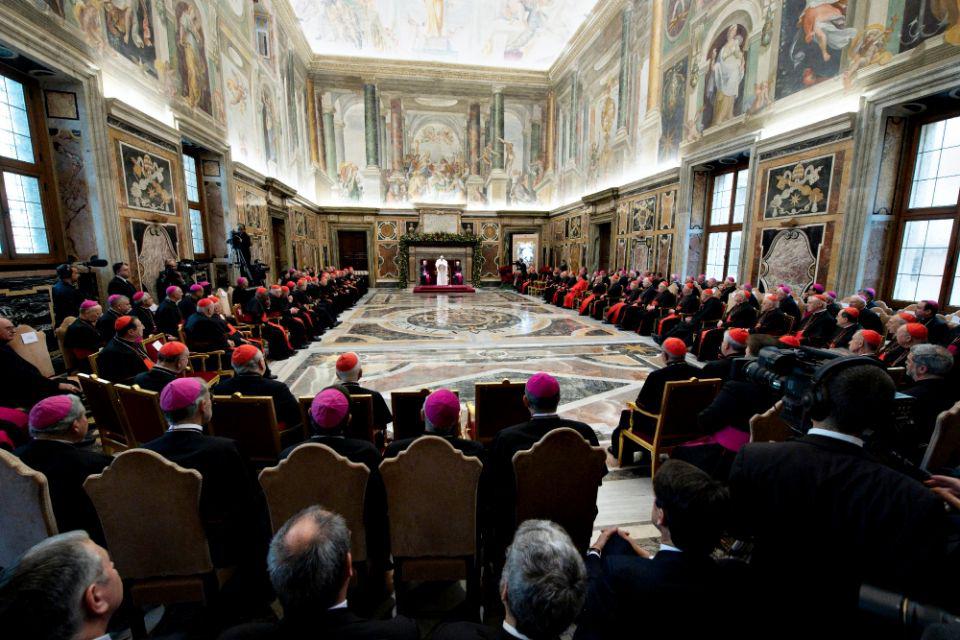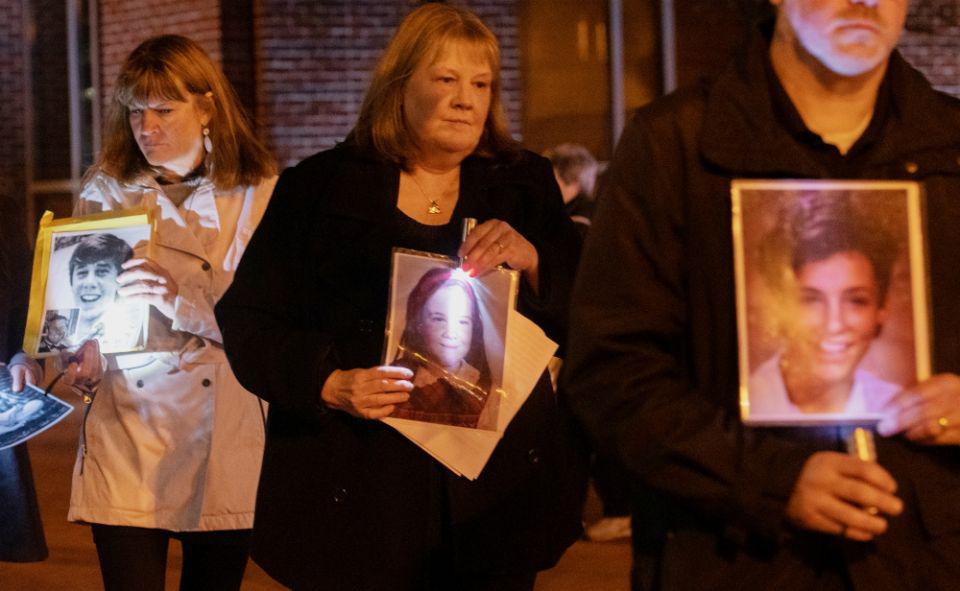|
Revived abuse crisis, newfangled simony dominated the church's 2018
By Michael Sean Winters
If the year 2018 in politics was dominated by Donald Trump, the life of the Catholic Church in this country in 2018 was marked by two major stories, one a reprise and the other just beginning, and one story that did not happen, the ecclesial dog that did not bark. In the event, Pope Francis addressed both major stories in his address to the Roman Curia just before Christmas: the clergy sex abuse crisis and the newfangled simony afflicting the church. I shall consider those comments in their proper place. When I ventured my predictions for the year last January, I did not predict that the clergy sex abuse crisis would return, and return with a vengeance, but it did. Beginning with the removal from ministry of, and subsequent resignation of his cardinalate by, Theodore McCarrick, followed by the Pennsylvania grand jury report, on through the November meeting of the U.S. Conference of Catholic Bishops, the issue sucked all the air out of the sanctuary. The leaders of the church still seem incapable of discussing their collective responsibility for the horrible crimes committed by clergy, still less of recognizing how hypocritical they look, as a body, having spent millions of dollars fighting the horrors of contraception insurance when they have not addressed the sickness of the clerical culture that not only permitted the crimes but covered them up and, in some instances, continue that cover-up even up to the present time. To be clear, there were real problems with the Pennsylvania report, which, like all grand jury proceedings, was biased toward the prosecution. Not wanting to appear insensitive to victims, many lawyers, clergy and others will privately admit that they thought the media firestorm the report generated was disproportionate to its actual findings. We are all horrified by the fact that clergy raped children, and the passage of time does not lessen the horror. But Pennsylvania Attorney General Josh Shapiro made it sound like these horrors happened yesterday, and the culture of covering those horrors up remained firmly intact, neither of which is exactly true. Yes, there is a case here or there, and in some instances, such as the recently disclosed case of Los Angeles Auxiliary Bishop Alexander Salazar, the treatment of the accused is inexplicable. The situation in Buffalo, New York, needs to be addressed and quickly. On the other hand, I believe the pressure on Cardinal Donald Wuerl to resign as archbishop of Washington was misplaced and an injustice was done to an outstanding churchman, one who was always ahead of the curve on this very issue. What the 2018 iteration of the crisis did unequivocally expose is the degree to which the clerical culture is unconverted and remains sick. Francis — who relied on bad information about the situation in Chile at the beginning of the year, leading to one of his worst moments as pope, corrected himself after sending Archbishop Charles Scicluna to investigate — clearly grasps that it is this clerical culture that needs reform. In his Letter to the People of God in August he stated, "Clericalism, whether fostered by priests themselves or by lay persons, leads to an excision in the ecclesial body that supports and helps to perpetuate many of the evils that we are condemning today. To say 'no' to abuse is to say an emphatic 'no' to all forms of clericalism." He gets it. In his Dec. 21 address to the Roman Curia, the pope dove even deeper into his diagnosis of the problem. Consider this remarkable passage:
NCR is at the forefront of the "communications professionals" who were denounced for exposing the crimes of clergy sex abuse, so these words were and are a source of professional pride for us. But it is that last sentence and its mention of "the greater scandal" that commands attention. When you pore through the documents of bishops who did cover up the crimes, time and again you find mention of the need to "avoid scandal." That was the theological principle used to justify self-serving behavior. Next week, I will look at the year ahead for the church, and the meeting in February of the presidents of all the world's episcopal conferences looms large. For the moment, I shall only note that here, in this idea of how the theology of scandal was misused, the bishops in union with the pope can build the theology that will lead them from proposals that only clean the outside of the cup to a conversion that cleans the inside. As I noted at the time, the core problem with the proposals laid before the U.S. bishops at their November plenary was that they only addressed the outside of the cup. Jesus had harsh words for such an approach in the Gospel of Matthew, 23:25. The pope's Curia address also mentioned the other major problem that continued to afflict the Catholic Church in the United States in 2018, the degree to which it has been put up for sale. The pope, speaking about those who used the crisis to achieve partisan advantage, added, "Behind these sowers of weeds, we always find the 30 pieces of silver." In October, I raised the question, "Can the Catholic Church be bought?", citing news reports from both Tom Roberts and Heidi Schlumpf. If it can't at least in America, it is not for want of effort. No less than George Weigel noted that in his latest visit to Rome, he was astonished at the degree to which the authorities in the Vatican believed the church in the United States was overly beholden to wealthy interests with ideological agendas. But if Francis originally acted on bad information in Chile, he and those around him have grasped the heart of the problem as it regards the church in the U.S. Behind both issues, clergy sex abuse and efforts to purchase influence, is the dog that did not bark. In a strong and incisive essay published at Sacred Heart University's "Go, Rebuild My House" forum, Robert Mickens argued that five years on, there is still enormous resistance to the mission-oriented vision Francis put forward in Evangelii Gaudium. He writes, "This revolutionary text remains largely unstudied and unimplemented at almost every level of the Catholic Church — parishes, dioceses, episcopal conference and even at Vatican." After years of calling for an "evangelical Catholicism," the Catholic right forgot that at the heart of the Gospels is concern for the poor, not concern for the sexual purity of upper-middle-class Catholics. Mickens makes the point that the sex abuse crisis has driven Evangelii Gaudium even further out of focus. "Revelations over the past year confirming that the clergy sexual abuse crisis and its institutional cover-up are a global phenomenon and not limited to just a few regions have further neutralized Evangelii gaudium's impact," he writes. Yet, in that document, Francis invited and urged the church to the kind of conversion that would address the clericalism that allowed the crime of clergy sex abuse, and other instances of pastoral abuse and dysfunction, to metastasize. I would add that not only would the clergy sex abuse mess have been confronted in a different way if Evangelii Gaudium had been embraced rather than ignored, we would also see more progress on implementing the vision of "Laudato Si', on Care for Our Common Home." We might have seen the U.S. bishops' conference send a high-level delegation, perhaps of all the U.S. cardinals, to the border to welcome the migrant caravan that Trump was denouncing. We might have seen more bishops move out of their mansions and into modest apartments at their cathedrals. We might have witnessed a more forceful effort to confront the libertarian heresy being taught at the bishops' university in Washington or the obscenely large executive compensation at Ascension and other Catholic health care networks. As in the life of the nation, the life of the church in 2018 was an annus horribilis. I confess that when I read my colleague Josh McElwee's report on Francis' comments on the plane returning to Rome from Chile and Peru, my heart sank and I questioned my confidence in the pope. Francis regained it as the year went on: Can anyone recall another instance when a pope publicly apologized for something he had done? And met with the victims whose veracity he had questioned? The bishops' conference in the U.S. seems determined to make itself as irrelevant and useless as possible, except to a narrow group of D.C.-based conservative interest groups and large funders who support a continuation of the culture wars and warm to the vision of more sectarian Catholicism. A grim year on that front. And the lay faithful are mostly led and organized by well-funded, archconservative groups and media. The Catholic left acts as if it has anemia, although I think it can be fairly said that in 2018, we here at NCR got our mojo back. Can the church round the corner in 2019? Tune in next week.
|
.
Any original material on these pages is copyright © BishopAccountability.org 2004. Reproduce freely with attribution.

